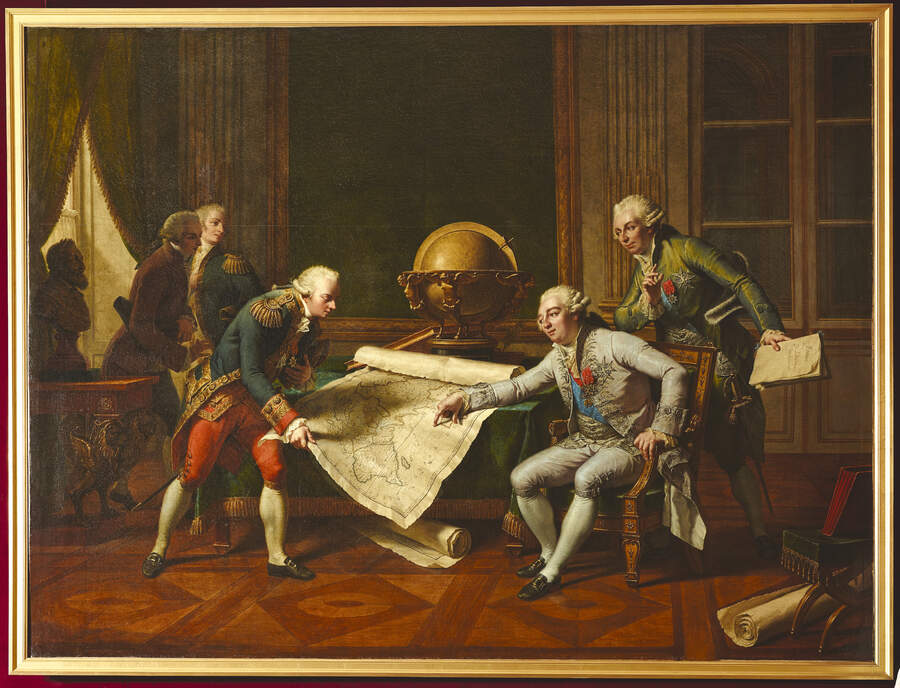Versailles: Science and Splendour – a 'blockbuster' exploration of 18th-century innovation
The show highlights how three French monarchs were fascinated with scientific research

A free daily email with the biggest news stories of the day – and the best features from TheWeek.com
You are now subscribed
Your newsletter sign-up was successful
Courtly life in 18th century Versailles is widely remembered as "a world of pure fantasy frolics", said Jonathan Jones in The Guardian.
Yet for all the excess and absolutism associated with the reigns of Louis XIV, Louis XV and Louis XVI, the three monarchs took an impressively "progressive lead" when it came to scientific research. Their patronage gave rise to many remarkable developments in engineering, natural science and medicine. This "glittering" exhibition at the Science Museum looks past the clichés surrounding Versailles, and illustrates how the palace was in fact a hive of experimentation and ingenuity: indeed, even the building and its grounds were "a technological achievement", its gardens full of "state of the art innovations". Featuring a wide array of exquisite objects, from drawings to machines and scientific equipment to taxidermy, this is a "blockbuster" of a show that should not be missed.
The rule of the last Bourbon kings coincided with "the elevation and systematisation" of science as a discipline, said Melanie McDonagh in The London Standard. Scientists sought – and often received – royal patronage, in the hope of presenting their discoveries at court. One such demonstration, commemorated in an illustration here, came courtesy of Étienne Montgolfier and his hot air balloon, which he tested before Louis XVI and Marie Antoinette, filling its basket with "a rooster, a sheep and a duck" (thankfully, they survived the ordeal). "Wonderful pieces" abound: a "superlative" watch with a crystal face made for Marie Antoinette; "beautiful" zoological paintings; and a series of "stuffed anatomical dolls designed to demonstrate practical obstetrics". All speak of a moment when science "was allied with the decorative arts", rather than practised with dry functionality. It is enough to make the visitor rather "wistful".
The Week
Escape your echo chamber. Get the facts behind the news, plus analysis from multiple perspectives.

Sign up for The Week's Free Newsletters
From our morning news briefing to a weekly Good News Newsletter, get the best of The Week delivered directly to your inbox.
From our morning news briefing to a weekly Good News Newsletter, get the best of The Week delivered directly to your inbox.
There are certain points at which you could be forgiven for thinking that "France's kings were interested in science only when it could satisfy their megalomaniacal desires", said Alastair Sooke in The Telegraph. A "freakishly enormous" hydraulic system was designed to bring water uphill from the Seine to Versailles's fountains. It never worked. You can see Jean-Baptiste Oudry's paintings of pineapples grown there – the ultimate status symbol. And you can see Louis XV's stuffed rhinoceros too; in life, the pampered animal was fed on bread and given "moisturising oil massages". Altogether scarier is "a wickedly elongated curved scalpel" created to "rid Louis XIV of an anal fistula". The surgery was rehearsed on 75 impoverished test subjects, some of whom died; the surgeon was "so traumatised that he never operated again". Altogether, the show is "a blast" – a superb exhibition that is also "a masterclass in brilliant, concise storytelling".
A free daily email with the biggest news stories of the day – and the best features from TheWeek.com
-
 Political cartoons for February 15
Political cartoons for February 15Cartoons Sunday's political cartoons include political ventriloquism, Europe in the middle, and more
-
 The broken water companies failing England and Wales
The broken water companies failing England and WalesExplainer With rising bills, deteriorating river health and a lack of investment, regulators face an uphill battle to stabilise the industry
-
 A thrilling foodie city in northern Japan
A thrilling foodie city in northern JapanThe Week Recommends The food scene here is ‘unspoilt’ and ‘fun’
-
 A thrilling foodie city in northern Japan
A thrilling foodie city in northern JapanThe Week Recommends The food scene here is ‘unspoilt’ and ‘fun’
-
 Tourangelle-style pork with prunes recipe
Tourangelle-style pork with prunes recipeThe Week Recommends This traditional, rustic dish is a French classic
-
 Samurai: a ‘blockbuster’ display of Japan’s legendary warriors
Samurai: a ‘blockbuster’ display of Japan’s legendary warriorsThe Week Recommends British Museum show offers a ‘scintillating journey’ through ‘a world of gore, power and artistic beauty’
-
 BMW iX3: a ‘revolution’ for the German car brand
BMW iX3: a ‘revolution’ for the German car brandThe Week Recommends The electric SUV promises a ‘great balance between ride comfort and driving fun’
-
 Arcadia: Tom Stoppard’s ‘masterpiece’ makes a ‘triumphant’ return
Arcadia: Tom Stoppard’s ‘masterpiece’ makes a ‘triumphant’ returnThe Week Recommends Carrie Cracknell’s revival at the Old Vic ‘grips like a thriller’
-
 My Father’s Shadow: a ‘magically nimble’ love letter to Lagos
My Father’s Shadow: a ‘magically nimble’ love letter to LagosThe Week Recommends Akinola Davies Jr’s touching and ‘tender’ tale of two brothers in 1990s Nigeria
-
 Send Help: Sam Raimi’s ‘compelling’ plane-crash survival thriller
Send Help: Sam Raimi’s ‘compelling’ plane-crash survival thrillerThe Week Recommends Rachel McAdams stars as an office worker who gets stranded on a desert island with her boss
-
 Book reviews: ‘Hated by All the Right People: Tucker Carlson and the Unraveling of the Conservative Mind’ and ‘Football’
Book reviews: ‘Hated by All the Right People: Tucker Carlson and the Unraveling of the Conservative Mind’ and ‘Football’Feature A right-wing pundit’s transformations and a closer look at one of America’s favorite sports